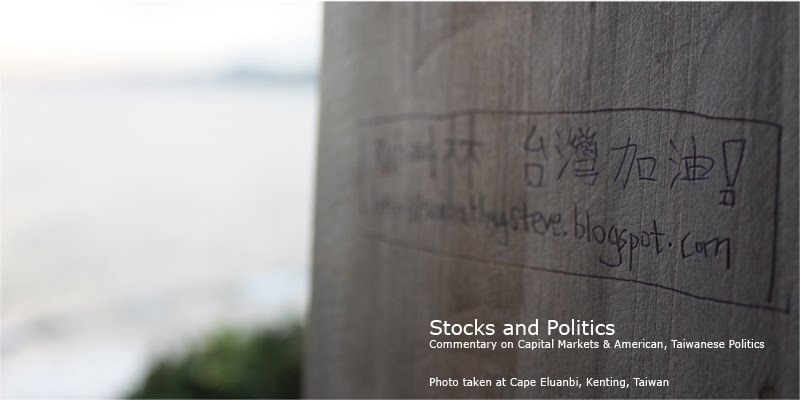I came across this article in
Canadian Business Online on how some Taiwanese businessmen view Taiwan as just a stop on their way to making fortunes in China. It's
a short article, but interesting to see how some Taiwanese are not shy at all about their intentions with China. That is, their intentions to fully disregard Taiwan's current political status as an independent democracy, in favor or making an extra buck or two (or three).
"Economic convergence will gradually lead to political convergence," says the straight-talking chairman of the Taiwan Mergers & Acquisitions and Private Equity Council. "You give the Taiwanese people enough candy and they will surrender in the end."
Huang's belief in economics as a prologue to politics is shared by many members of Taiwan's powerful business community, which provides key backing for President Ma Ying-jeou's signature policy of linking Taiwan's high tech economy to China's lucrative markets.
Since Ma took office in May 2008, Taiwan's economic connection to the mainland — already robust even under the pro-independence regime of his predecessor — has moved into high gear, spurred by this year's signing of a partial free trade agreement between the sides, and the rapid acceleration of direct flights and shipping across the 100-mile- (160-kilometer-) wide Taiwan Strait.
Huang is certainly on the same page with those in China; seeing not only that economic integration is just a means for them to bait Taiwan into political integration, but also that Ma Ying-jeou is a key player in Beijing's plans for Taiwan.
The article makes a point that is often portrayed incorrectly in that economic cooperation between Taiwan and China was already happening and increasing every year under the presidency of Chen Shui-bian. While it was at a much slower-pace, one must view the slow pace in a favorable way. As the "high gear" approach that Ma Ying-jeou has undertaken is something that has basically happened without any sort of oversight by the legislature, as well as the people of Taiwan.
Furthermore, a large part of the reason for the quick economic agreements that have taken place is due to the fact that Ma has no longer maintained Taiwan's sovereignty in negotiating with China. Whereas, during the Chen Shui-bian era, the DPP would only negotiate with China if China did not have the prerequisite of coming to the table under the agreement of the One China Policy - that is, Taiwan and China are both one country.
Another interesting thing that Huang stated was on the future of Taiwan and China:
Still, the business community is convinced that time is on the side of eventual union.
"I think it will take about ten years for a political arrangement to take place," said Huang, who believes that Ma will be re-elected in 2012 "because people will think twice" about sacrificing the benefits of their China economic connection.
Personally, I have been under the belief that the longer Taiwan and China remain separate, the harder it will be for China to bring Taiwan under their umbrella under favorable circumstances. Perhaps even under unfavorable circumstances (by force), it may become harder as the years progress. The way I look at it is like this:
1) During the 8 years under Chen Shui-bian, Chen did a great job in cultivating a pride in Taiwan, domestically and abroad. Now with 2 years under China-leaning Ma, polls have continued to show a continual move towards favoring independence and status-quo, and a lower amount of those supporting unification. The numbers run similar for considering oneself as Taiwanese and/or Chinese. With that said, it does not make sense that even under further KMT-rule, that the people of Taiwan would revert back to pro-unification and pro-not Taiwanese thinking.
2) The result of #1 is that it inevitably affects how Ma can run the government on Taiwan (especially in terms of cross-straits policy). The problem for Ma right now is that while he wants to push his agenda with China faster and quicker, the Taiwanese are pushing back. They are doing this on the streets in protests, and at the ballots. This results in a sort of stand-still for Ma in which he can't push too far towards China without losing credibility on Taiwan.
3) Consider this as well. China is very much aware of how the relationship between Taiwan and China did not progress in
their favor under the Chen administration. Any hopes of pursuing unchecked economic integration under the One China Principle was totally hopeless to them. Naturally, any hopes of pursuing political integration would be out of the question. Thus, it's reasonable to assume that China would like to continue to see their willing partner in Taiwan, Ma Ying-jeou, continue to remain in office through 2016. Otherwise, under another DPP administration, their efforts over the past 2 years (4 eventually) in furthering a Taiwan-China inseparable integration, will likely have gone to waste.
The only reason I can think of at this point that would allow China to have an easier time as time goes on for unification, is via force and military means. Within the next decade, China should have their aircraft carriers and other marine forces up and running - able to compete and perhaps deter the U.S. from entering into the area to protect Taiwan. We've seen many times in the past where China has backed down after the U.S. got involved in the area. If China can contain the U.S. involvement, politically as well as militarily, between Taiwan and China, then their chances of succeeding in unifying Taiwan with China by force, greatly increases.





